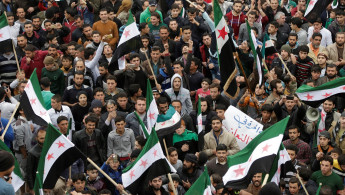Opposition official rejects Russia's federalism plan for Syria
The Russian proposal for a federal Syria is unacceptable, said opposition negotiation commission coordinator Riad Hijab on Monday.
Russian deputy foreign minister Sergey Ryabkov said last week that Russia supports whatever arrangements the Syrians in the current negotiations reach about the future, included a possible federal state.
"If as a result of talks, consultations and discussions on Syria's future state order ... they come to an opinion that namely this (federal) model will work to serve the task of preserving Syria as a united, secular, independent and sovereign nation, then who will object to this?" Ryabkov said.
"Syria's unity is a red line. This issue is non-negotiable and the idea of federalism is the prelude to the partitioning of Syria," Riad Hijab said.
"This is completely unacceptable," he said. "We agreed on the idea of administrative decentralization" at the Riyadh conference in December 2015 when the HNC was formed.
Syria's Kurds, who have set up three autonomous regions since the outbreak of the war in 2011, back the idea of federalism.
In January 2012, several Syrian Kurdish groups proposed that a referendum be held to give voters the choice between decentralisation, autonomy or federalism.
 |
The opposition's position on attending peace talks in Geneva next week remains unclear. |  |
Hijab said renewed fighting meanwhile, as well as arrests by Syrian government forces, were causing the opposition to consider whether it should attend the talks.
Syrian government forces backed by Russian airstrikes committed a "massacre" of scores of civilians in Idlib governorate on Monday, part of a pattern of breaches of a two-week truce, opposition coordinator Riad Hijab told reporters.
A spokesman for the High Negotiations Committee, the body representing Syria's opposition, said early Monday that the HNC's delegation to the talks would arrive Friday.
"After consultations, the High Negotiations Committee agreed to go to Geneva. The delegation is expected to arrive on Friday," Riad Naasan Agha, a spokesman for the group, told AFP.
But in the conference call later with reporters, HNC head Riad Hijab said his group would announce its decision later this week.
"The HNC will assess the situation in the coming days and we will take the appropriate decision (on attending)," Hijab said by telephone from Riyadh.
The HNC has said it represents nearly 100 rebel factions that have signed on to the truce for an initial two weeks.
The truce will reach its two-week mark on March 12.
Asked if the HNC would extend its commitment to the ceasefire, Hijab said the body would discuss the situation on the ground with opposition fighters "and based on this, we will make our decision."
 |
The negotiations will be the first held since an unprecedented ceasefire took hold on Feb. 27 following an agreement between Russia and the United States. |  |
Syrian regime invited
The Syrian government has been invited to a new round of peace talks with the opposition in Geneva from March 14, a source close to the government delegation said Monday.
"The delegation received an invitation on Sunday from the United Nations, asking us to take part in negotiations starting March 14 in Geneva," the source told AFP, speaking on condition of anonymity.
The source did not specify when the government delegation would arrive in the Swiss city for the latest round of indirect negotiations aimed at ending the nearly five-year conflict.
The negotiations will be the first held since an unprecedented ceasefire took hold on Feb. 27 following an agreement between Russia and the United States.
The UN's Syria envoy Staffan de Mistura had said the new talks would begin from Thursday.




 Follow the Middle East's top stories in English at The New Arab on Google News
Follow the Middle East's top stories in English at The New Arab on Google News

![A group of Palestinians, foreign and Israeli activists gather to participated in an olive picking event on the land in the town of Battir, which is under threat of confiscation by Israel in Bethlehem, occupied West Bank on 8 November 2024. [Getty]](/sites/default/files/styles/image_330x185/public/2182930803.jpeg?h=199d8c1f&itok=__0LgGsa)
